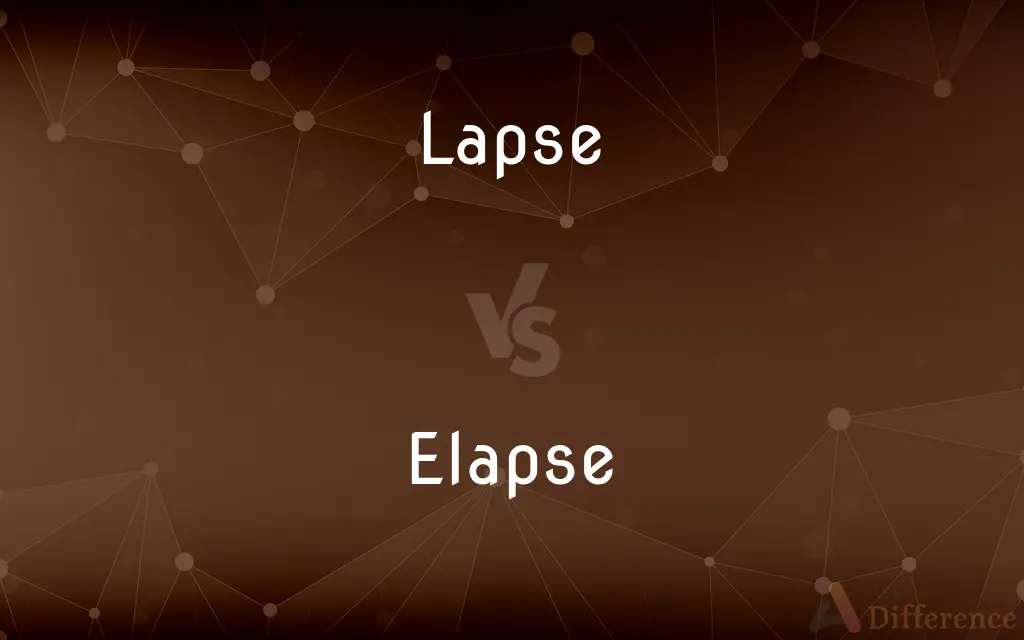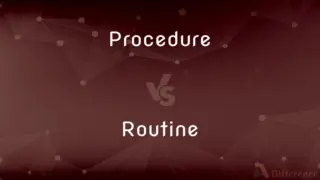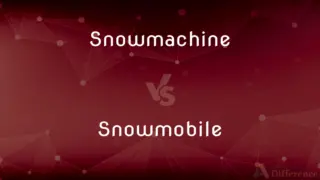Lapse vs. Elapse — What's the Difference?
By Tayyaba Rehman — Updated on November 6, 2023
'Lapse' refers to a temporary failure or slip, while 'elapse' describes the passage of time.

Difference Between Lapse and Elapse
Table of Contents
ADVERTISEMENT
Key Differences
'Lapse' is commonly used to denote a slip or error in judgment, a decrease in attention, or a gap in continuity. It often carries a connotation of something that has been lost or has deteriorated. 'Elapse' refers to the passage of time and is often used in a more neutral context, simply to indicate that time has passed without any implication of error or loss.
A 'lapse' can also mean the expiration of a period of time, such as a contract or a period of insurance coverage, suggesting a cessation of a state or condition. 'Elapse' is a verb that does not carry the connotation of an ending but instead focuses on the process of moving from one point in time to another.
When talking about a 'lapse in judgment,' it suggests a momentary failure or oversight. On the other hand, 'elapse' would not be used in this context because it does not convey the idea of an error or omission, but the simple transition or occurrence of time.
In the context of a 'lapse of memory,' the word 'lapse' suggests a temporary failure or forgetting. 'Elapse,' however, would be out of place in this context, as it does not relate to the concept of forgetting or failure but to the chronological flow of time.
Overall, 'lapse' often implies a temporary deviation from a standard or norm, whether that's a lapse in concentration, a policy lapse, or a moral lapse. In contrast, 'elapse' is used when referring to the duration or passage of time, such as when several hours elapse during a lengthy meeting.
ADVERTISEMENT
Comparison Chart
Definition
A temporary failure or gap.
The act of time passing.
Usage
Noun (a lapse) or verb (to lapse).
Verb only (to elapse).
Connotation
Often negative, implying error or decline.
Neutral, indicating the passage of time.
Context
Used in reference to mistakes or expiries.
Used to describe duration/time intervals.
Examples
Lapse in judgment, policy lapse.
Hours elapse, time elapses.
Compare with Definitions
Lapse
A period of time coming to an end, particularly in contracts or agreements.
The insurance policy faced a lapse after the payment was missed.
Elapse
The act of time slipping past.
Ten minutes elapsed while I was on hold.
Lapse
A temporary failure of concentration, memory, or judgment.
A brief lapse of memory caused her to forget the answer.
Elapse
To pass or go by, used with reference to time.
Several years elapsed before they met again.
Lapse
A brief or temporary failure of concentration, memory, or judgement
A lapse of concentration in the second set cost her the match
Elapse
To occur or happen over a period of time.
Weeks elapsed before the issue was resolved.
Lapse
An interval or passage of time
There was a considerable lapse of time between the two events
Elapse
The process of time moving forward.
As the hours elapsed, the crowd grew impatient.
Lapse
(of a right, privilege, or agreement) become invalid because it is not used, claimed, or renewed; expire
He let his membership of CND lapse
Elapse
For a period to pass, often without notice.
Time elapses quickly when you're having fun.
Lapse
Pass gradually into (an inferior state or condition)
The country has lapsed into chaos
Elapse
(of time) pass or go by
Weeks elapsed before anyone was charged with the attack
Lapse
To fall from a previous level or standard, as of accomplishment, quality, or conduct
Lapse into bad habits.
A team that lapsed into mediocrity halfway through the season.
Elapse
To slip by; pass
Weeks elapsed before we could start renovating.
Lapse
To deviate from a prescribed or accepted way
Lapse into heresy.
Elapse
Passage; lapse
An elapse of many years.
Lapse
To pass gradually or smoothly; slip
Lapse into reverie.
Elapse
To pass or move by.
He allowed a month to elapse before beginning the work.
Several days elapsed before they met again.
Lapse
To come to an end, especially gradually or temporarily
He realized that his attention had lapsed and he hadn't heard the assignment.
Elapse
To slip or glide away; to pass away silently, as time; - used chiefly in reference to time.
Eight days elapsed; at length a pilgrim came.
Lapse
To be no longer valid or active; expire
She allowed her membership to lapse after the first year.
Elapse
Pass by;
Three years elapsed
Lapse
(Law) To cease to be available as a result of expiration, disuse, or impossibility. Used of a right or privilege.
Lapse
To go by; elapse
Years had lapsed since we last met.
Lapse
To allow to lapse.
Lapse
A usually minor or temporary failure; a slip
A lapse of memory.
A lapse in judgment.
Lapse
A deterioration or decline
A lapse into barbarism.
Lapse
A moral fall
A lapse from grace.
Lapse
A break in continuity; a pause
A lapse in the conversation.
Lapse
A period of time; an interval
A lapse of several years between the two revolutions.
Lapse
(Law) The termination of a right or privilege as a result of expiration, disuse, or impossibility.
Lapse
A temporary failure; a slip.
Memory lapse
Lapse of judgment
Lapse in security
Lapse in concentration
Lapse
A decline or fall in standards.
Lapse
A pause in continuity.
Lapse
An interval of time between events.
Lapse
A termination of a right etc., through disuse or neglect.
Lapse
(meteorology) A marked decrease in air temperature with increasing altitude because the ground is warmer than the surrounding air.
Lapse
(legal) A common-law rule that if the person to whom property is willed were to die before the testator, then the gift would be ineffective.
Lapse
(theology) A fall or apostasy.
Lapse
(intransitive) To fall away gradually; to subside.
Lapse
(intransitive) To fall into error or heresy.
Lapse
To slip into a bad habit that one is trying to avoid.
Lapse
(intransitive) To become void.
Lapse
To fall or pass from one proprietor to another, or from the original destination, by the omission, negligence, or failure of somebody, such as a patron or legatee.
Lapse
A gliding, slipping, or gradual falling; an unobserved or imperceptible progress or passing away,; - restricted usually to immaterial things, or to figurative uses.
The lapse to indolence is soft and imperceptible.
Bacon was content to wait the lapse of long centuries for his expected revenue of fame.
Lapse
A slip; an error; a fault; a failing in duty; a slight deviation from truth or rectitude.
To guard against those lapses and failings to which our infirmities daily expose us.
Lapse
The termination of a right or privilege through neglect to exercise it within the limited time, or through failure of some contingency; hence, the devolution of a right or privilege.
Lapse
A fall or apostasy.
Lapse
To pass slowly and smoothly downward, backward, or away; to slip downward, backward, or away; to glide; - mostly restricted to figurative uses.
A tendency to lapse into the barbarity of those northern nations from whom we are descended.
Homer, in his characters of Vulcan and Thersites, has lapsed into the burlesque character.
Lapse
To slide or slip in moral conduct; to fail in duty; to fall from virtue; to deviate from rectitude; to commit a fault by inadvertence or mistake.
To lapse in fullnessIs sorer than to lie for need.
Lapse
To fall or pass from one proprietor to another, or from the original destination, by the omission, negligence, or failure of some one, as a patron, a legatee, etc.
If the archbishop shall not fill it up within six months ensuing, it lapses to the king.
Lapse
To let slip; to permit to devolve on another; to allow to pass.
An appeal may be deserted by the appellant's lapsing the term of law.
Lapse
To surprise in a fault or error; hence, to surprise or catch, as an offender.
For which, if be lapsed in this place,I shall pay dear.
Lapse
A mistake resulting from inattention
Lapse
A break or intermission in the occurrence of something;
A lapse of three weeks between letters
Lapse
A failure to maintain a higher state
Lapse
Pass into a specified state or condition;
He sank into Nirvana
Lapse
End, at least for a long time;
The correspondence lapsed
Lapse
Drop to a lower level, as in one's morals or standards
Lapse
Go back to bad behavior;
Those who recidivate are often minor criminals
Lapse
Let slip;
He lapsed his membership
Lapse
Pass by;
Three years elapsed
Lapse
A slip or error in behavior or judgment.
There was a noticeable lapse in his concentration during the match.
Lapse
A decline from previously high standards.
The team has suffered a lapse in quality this season.
Lapse
To fall from a previous level or standard, to backslide.
After two years of sobriety, he unfortunately lapsed again.
Common Curiosities
Can 'elapse' be used as a noun?
No, 'elapse' is only used as a verb.
What is a 'lapse' in terms of insurance?
A lapse in insurance occurs when a policy is terminated due to nonpayment or expiration.
How do you use 'lapse' in a sentence?
You might say, "He had a lapse in concentration during the exam."
What does it mean for time to elapse?
For time to elapse means for it to pass.
Can 'lapse' indicate something positive?
'Lapse' typically indicates a negative occurrence or a reduction in quality.
What is the difference in the usage of 'lapse' and 'elapse'?
'Lapse' can be a noun or verb indicating error or end, while 'elapse' is a verb related to the passage of time.
What does "lapse" mean?
"Lapse" is a noun referring to a temporary failure or a period of time that has passed; as a verb, it means to revert to a previous state or to expire.
Can "elapse" be used as a noun?
No, "elapse" is not commonly used as a noun; "elapsed" time would be the correct term when referring to the noun form.
Can both "lapse" and "elapse" refer to time?
"Lapse" can refer to a period of time when used as a noun; "elapse" always refers to the process of time passing.
What does "elapse" mean?
"Elapse" is a verb meaning to pass or go by, specifically referring to time.
Can "lapse" be used as a verb?
Yes, "lapse" can be a verb, as in "The membership can lapse if not renewed."
How do you use "elapse" in a sentence?
"Several hours elapse before the rescue team arrives."
Is "lapse" used for specific types of failures?
Yes, "lapse" often refers to errors in judgment, morality, or continuity, such as a lapse in security or a lapse in concentration.
What is a common synonym for "elapse"?
A common synonym for "elapse" is "pass," as in time passing.
What is a common synonym for "lapse"?
A common synonym for "lapse" (noun) is "oversight," and for "lapse" (verb), it is "expire."
What's the difference between "time lapse" and "time elapsed"?
"Time lapse" refers to a period between events or a photography technique, while "time elapsed" refers to the amount of time that has passed.
Share Your Discovery

Previous Comparison
Procedure vs. Routine
Next Comparison
Snowmachine vs. SnowmobileAuthor Spotlight
Written by
Tayyaba RehmanTayyaba Rehman is a distinguished writer, currently serving as a primary contributor to askdifference.com. As a researcher in semantics and etymology, Tayyaba's passion for the complexity of languages and their distinctions has found a perfect home on the platform. Tayyaba delves into the intricacies of language, distinguishing between commonly confused words and phrases, thereby providing clarity for readers worldwide.















































